Click here for Exit the Cuckoo's Nest's posting standards and aims.
WALKING WITH GOATS: TAKING STOCK

by our regular guest columnist Walking With Goats
I wanted to write to you about morality, in the light of what I do. It’s been the right time of year for facing demons. We speak of violence, traditionally, and sex of course, when we invoke the word ‘immoral.’ In animal husbandry, this is the season for both.
Outside, autumn’s giving way in a rough exchange. There’s been rain every day; a lot of them barely lighten. In our small nearby town – the oldest town in Mid Wales (and no ‘village’, any resident there will assure you) – the houses stand outcropped against the dark, one shouldered pool of light each. You can see though, driving down from our hill, Gwastedyn, how they’re all borne together through the valley on the limbs of the crossroads. People need each other here, especially as winter comes. Soon we’ll raise the tallest manhandled Christmas tree in the country, level with the face of the memorial clock – Little Ben, my daughter calls it. But we’re not there yet.
First, the year’s rites of passage.
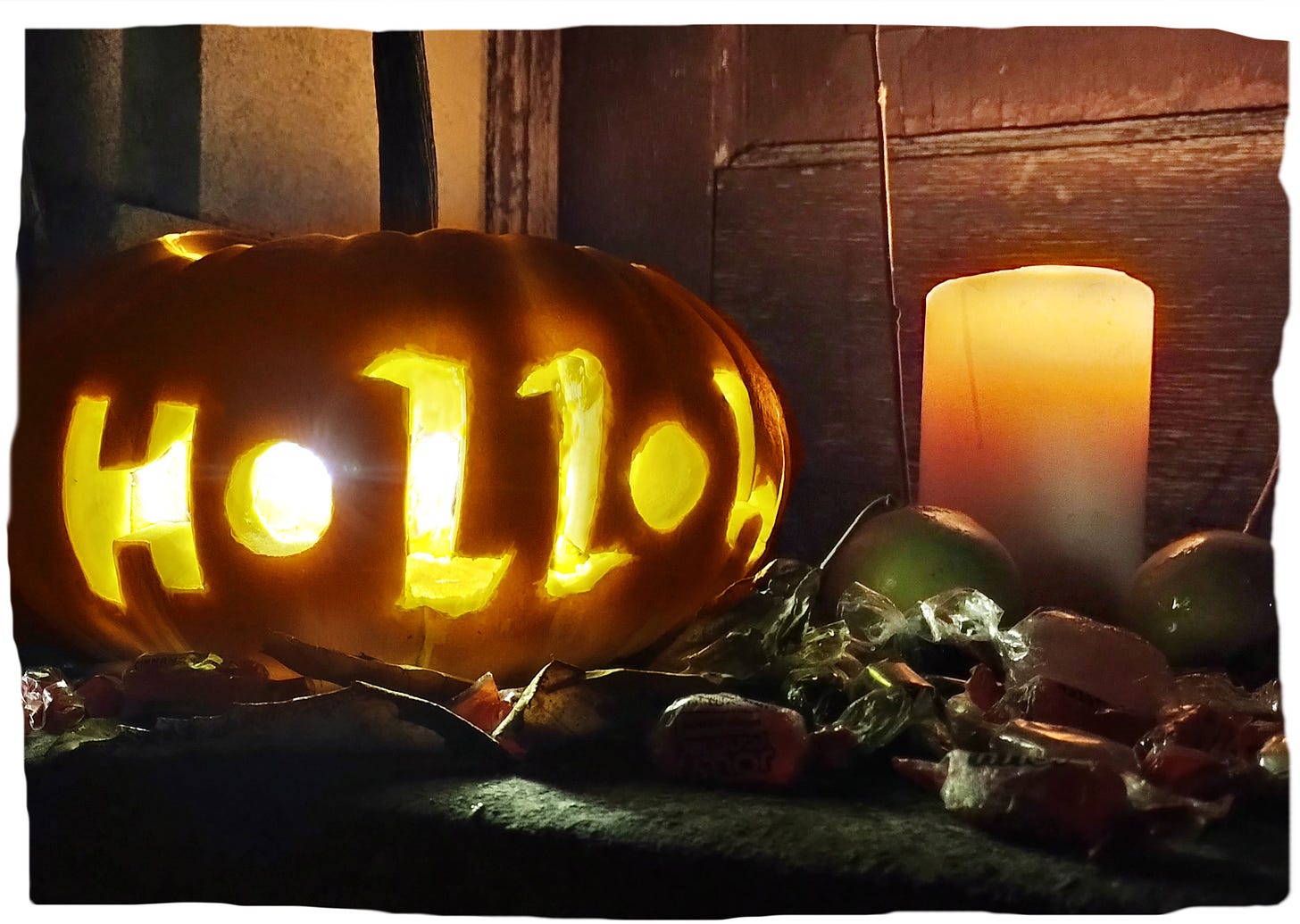
Although the synchronised backstep of our many clocks lends safe calculation to the early darkness, we’re still concerning ourselves with the rituals that ward off evil. They have no bearing on morality – or indeed mortality – for us now. Yet we observe them.
You can get what you need for the most part at Co Op, which spills its light across the pavement long after every other building’s curtains have been drawn. There are sales, first on pumpkins, then sparklers, then poppies. Its broad threshold open-access this year, if there’s any danger to us, here in this little town in the very centre of Wales, then it’s blocked out comprehensibly in red and black on the newspaper stand just in front of the automatic door. There are no figures outside now, queuing two metres apart.
The science settled in so many directions, still superstition calls.
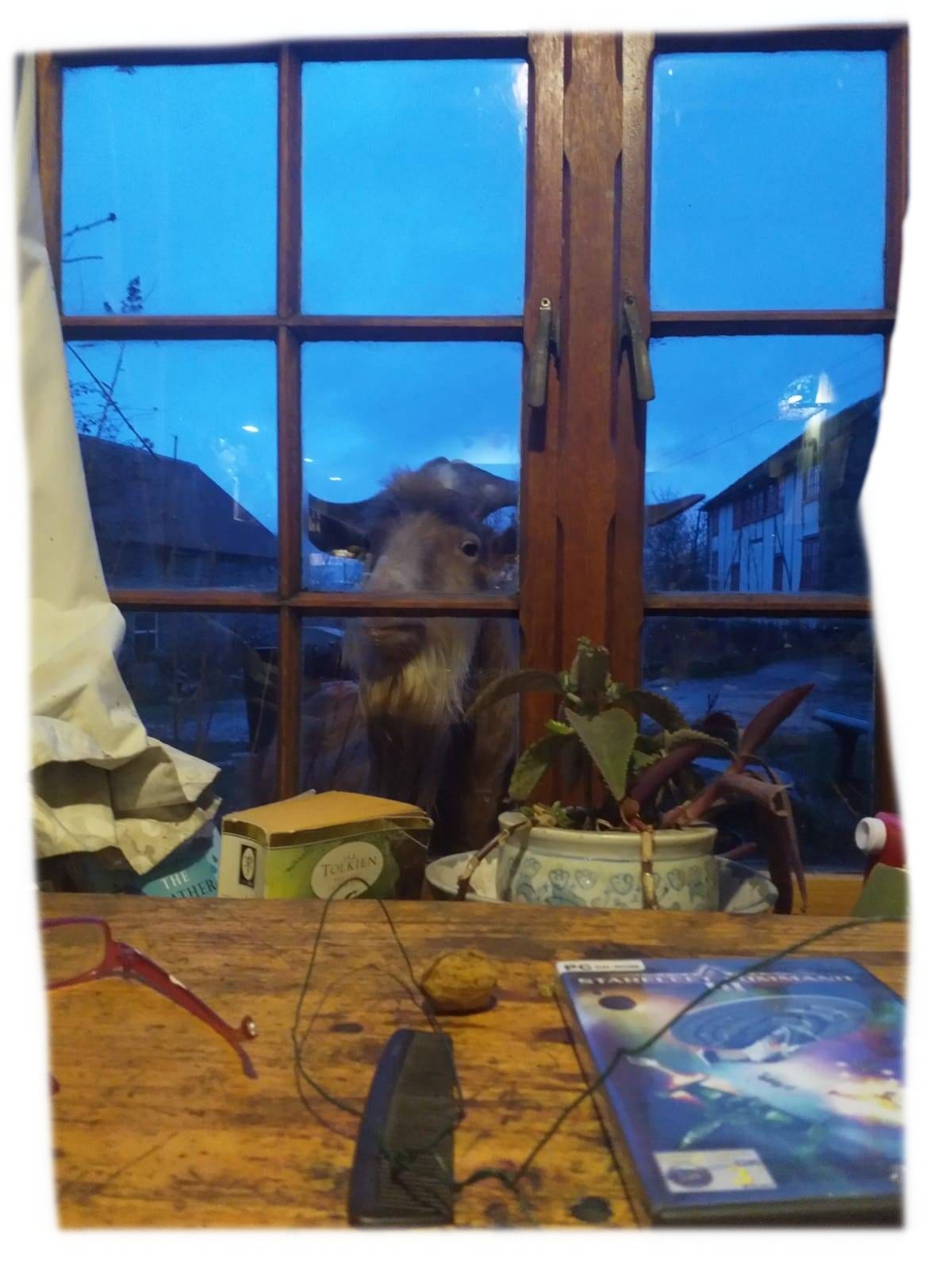
Indeed.
Unrestrained by either social or ethical convention, here is the original progenitor of Aleister Crowley’s moral Everything-App “…And do as thou wilt shall be the whole of the Law.”
Yes, the devil is depicted as a male goat for good reason.
Now’s an excellent moment to observe this inspiration for deities and demons too, when science is about to make us gods ourselves. For we feel far from it. Here at the end of 2022, we’re allowed to see one another of course – but no one’s really that keen to speak up anymore. Perhaps we need to conjure the forces raised by ancient rites. Stunned so recently into captive silence by state-of-the-art religious revelations such as ‘Virtual Harvest,’ frankly who at this point would turn down a spirit guide?
So it is that this episode of Walking With Goats is a dance on the edge of the volcano: a four hooved step, of sex and death entwined.
Farming holds many secrets from society.
Here’s one from the first sphere of interest (and both are weighty and potent, I assure you):
Billy goats drink their own semen. And as if this wasn’t enough to make an impression, I can tell you something else: it’s a skill all the more notable in light of the force and volume with which it emerges – not to mention the regularity.
‘Now, now. You mustn’t do that…’ my sweet, aging, sheep farming neighbour told Burtie, seeing his dexterous accomplishment underneath the canopy of an alder tree after the July hay had been cut. ‘… Because I can’t.’
Burtie was magnificent. He was my stud billy, also aging then – able to down a pint glass of beer in four unequivocal swallows – grand with the stink of goat musk, both a gentle beast and a brutal one in turns. I shared my life with him for almost three years. Nor was he shy of the share he took from it. Burtie’s needs – or wants, or indeed momentary whims – would on no account be denied.
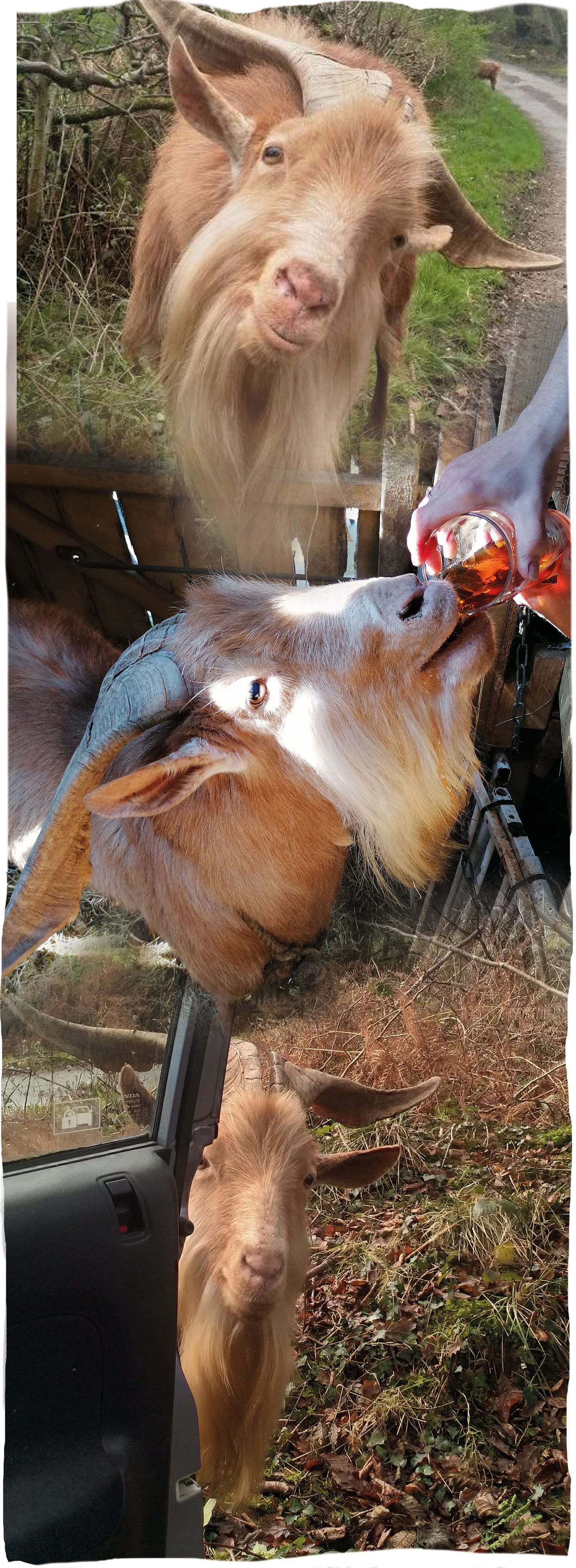
I miss him very deeply.
The gravity of the phrase to take stock – which we use without thinking – is one of slow, real force in my own life. Day or night, I can’t get away from it. The silence in a farmer’s eyes is the count of years – decades for some – of taking stock.
I loved Burtie. I feared him, but I managed him – with treats and temptations and regular patterns, with twice cladded walls and simple words. He nibbled my fingers. When I made mistakes – looked away at the wrong moment for instance – he might, if he felt like it, take the opportunity to ram me with both horns. Every day I stroked his nose. I ran from him almost as frequently. He was beautiful and he knew his beauty too. He was king.
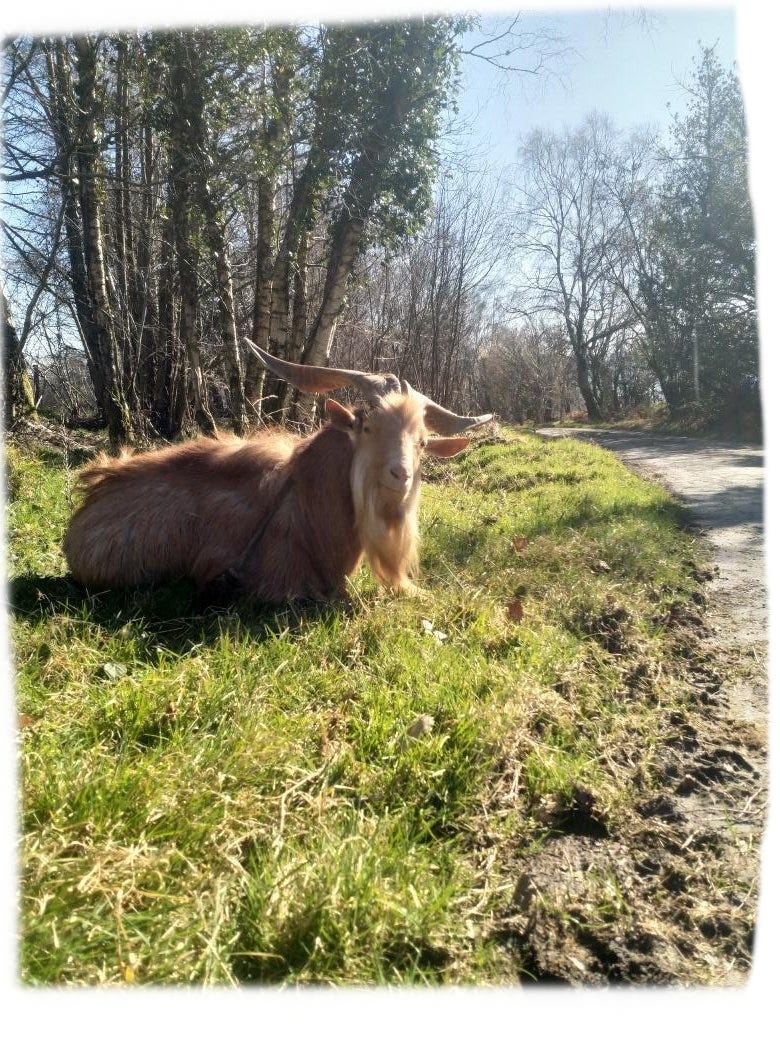
Burtie came from a Christmas Tree farm in the West Midlands with security cameras over the double gates. He was unnamed then and, along with the other goats in his cage, (all owned by a man named Tony, and by Tony’s son – who was also called Tony) he’d never been handled. It took me six months to put a collar around his neck so I could treat his feet.
Tony the Younger had a camel hair coat and patent leather shoes, so presumably wasn’t really that involved with the daily goat herding. When I arrived, he was busy burning Christmas trees.
I was new to farming. I didn’t ask any questions.
While the older Tony directed other extremely well-built employees of the Christmas tree nursery to wrestle Burtie into the van we’d retrofitted for transporting him, the totality of my ignorance in the field of animal husbandry had an opportunity to burn itself into my vision. Burtie’s horns were more than three feet wide. Rearing, he was almost twice my height. The men who weren’t Tonys leaped backwards out of the van and slid the door closed.
Back on our smallholding though, after a night peering through the round window in the Volkswagen Crafter’s rough OSB partition at his two new female goats, who at that time roamed freely (in and out of any vehicle they liked in fact), Burtie was not wilfully aggressive. Released for the first time into our unfenced larch woodlands, he neither attacked us nor ran away.
My relationship with him was a seesaw of domination I suppose, but with a fulcrum of gentleness as its centre. He didn’t really understand – and, because in the end he was an animal, he didn’t really care – if he attacked me, how much he might hurt me. I fought him off with a rake when he headbutted the feedbins. I showed him the severed head of the ram he knew on the first occasion that he really did me physical damage, and for some time after that I gained a position of strength that protected me – but in the end, Burtie was larger. I was the one with the things he needed. For his final year, he spent his days on a chain. Each day we went walking, I took him with us, fixing him to a tree at our destination point so that he was never left behind. Each afternoon I gave him a homebrew bitter when I put him in.
I loved Burtie and I didn’t want to kill him, but neither did I want to kill his two remaining sons, Opal and Octavian, who were gentle and might one day grow their own mantles of horns. Come autumn, I realised couldn’t house them together though. As mating season arrived, his sons – with their own now-sizeable scrotums – hadn’t left, and Burtie destroyed his stall, twice clad with marine ply. I tried as swiftly as possible to build him a separate home. Tied outside overnight as the evenings got colder though, I couldn’t finish it in time for him. Seven pm, losing visibility the final night, I failed to see the timber I was cutting for the crossbeam was cut on the diagonal already. When I tried to fit it into place, it was too short to use – despite my having checked the measurement three times, and left myself a margin. I walked away from the new house, still unfinished, crying – because it was raining on him and because in my heart I think I knew. The next morning, bringing him his hay, he attacked me so badly I had to be rescued by my neighbours. They pulled him off me, where he was bearing down, having driven me into the woodpile. My back took the projection of two sawn logs directly on the spine.
It’s finished now, the Nice New Field House. Kama stands inside and bleats to me, to show that its very existence must proclaim The Darlings’ significance. It was meant for Burtie – but regardless, he wouldn’t have been happy there at night, I know. Even if I’d managed to finish it before the weather and his adolescent sons – still housed with their mothers, with his does – had so enraged him, it would have been no life for him alone.
Many of farming’s secrets, I wish I hadn’t learned. We’re unique, us humans – within the species that I have lived alongside at least – in our sympathy and so our remorse.
I went into this in 2020 (though I had chickens and ducks already by then), afraid and ignorant, but determined to meet the cost of my family’s lives. As the veils have fallen from the world, the mechanics of its forced upheaval bared in stages, I’ve kept on; trying to lay down the foundations for resilience. Like most people who refused to participate in the vaccination program, I have had the imperative. Still, it’s been the hardest thing I’ve ever done. Self-sufficiency in the hills of Wales has always been a way of life entwined with animal husbandry. Maybe before enclosure, when the flocks roamed free, the shepherd felt at one with God.
Writers use the memories of others as their palette; a filigree of colours and associations drawn up from within. So it is, I think, with the orchestration of morality and social control.
I try to use the communion of writing to raise questions. Now is the time when we must unpick the stories we are being told.
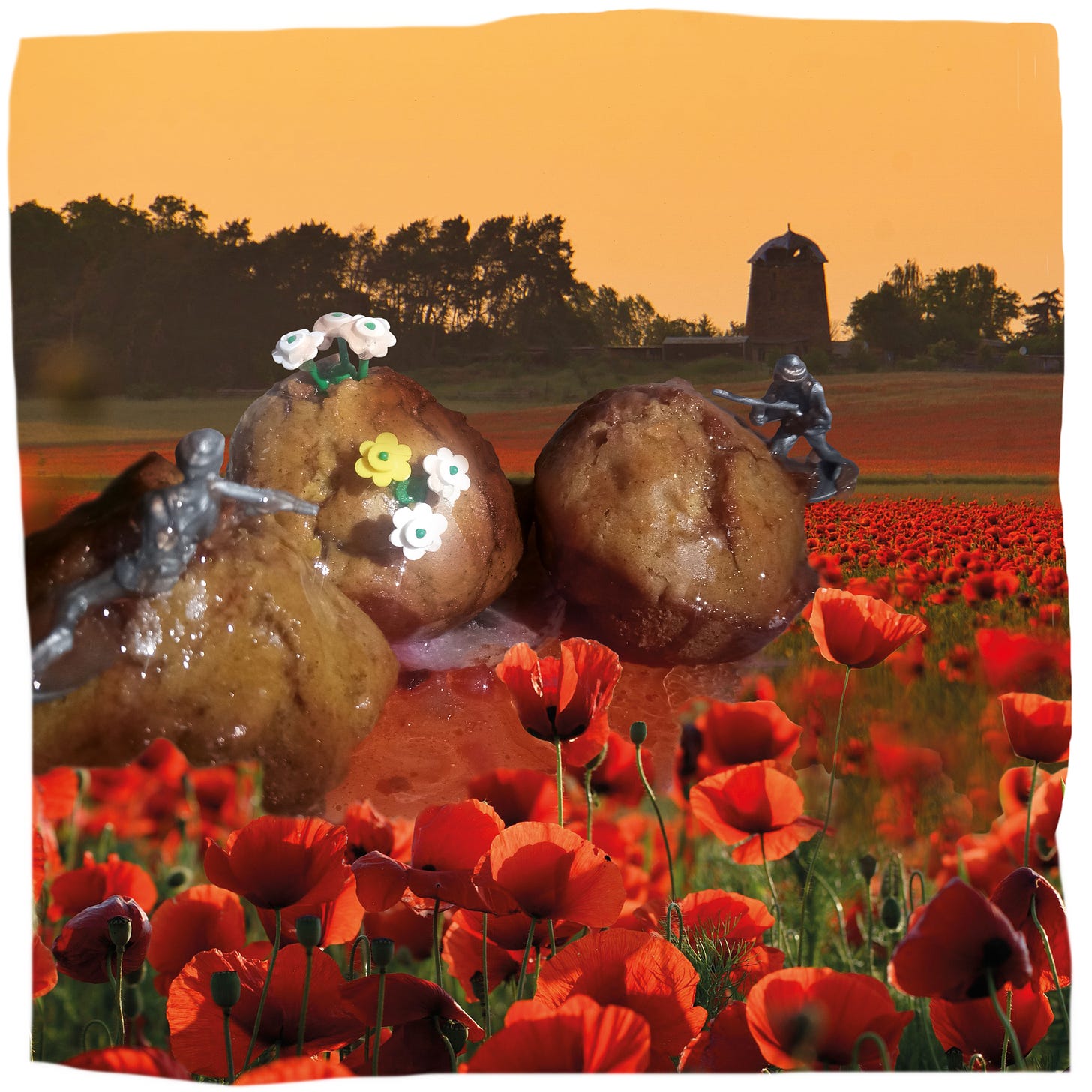
When our churches and schools and pubs and cafes were closed under the pall of the pandemic and the screens we were left with introduced us to the counterintuitive notion that being there for each other actually meant being somewhere else, thankfully our supermarkets didn’t fail us, but did their absolute best to step up home deliveries.
And everyone was smart, and knew which side their bread was buttered. No one attacked Gareth on the doorstep as he handed over the Ocado bags – even though he was the (unassuming, slightly nervous) visible face of the strategic partnership of stakeholders benefitting from our imprisonment. Quite the opposite in fact: people thanked him, and held his gaze above the mask. The nightly news giving everyone the facts that they needed to understand – as had been the case throughout all other stages of human history – the concept of morality and the ability to subsist went hand in hand.
Morality’s changing all the time now. It’s really hard to keep up, which is maybe part of the reason that no one wants to take stock of any previous issues – like how the government of every country in the world unanimously enacted totalitarian control and we all went along with it. They had the same logos and taglines too. I don’t know if you noticed that.
There’s a lot of conversation about war this year. Everyone’s ready to get behind wiping out Putin with candles and low-sunflower oil Hellman’s mayonnaise. It’s almost immoral not to want to die in an apocalypse for democracy.
In such a situation, who can know what morality means anymore? If the newspapers were all sold out, so that you had to stop someone in front of the Co Op’s self-checkout to ask them about the subject instead, they wouldn’t want to answer you.
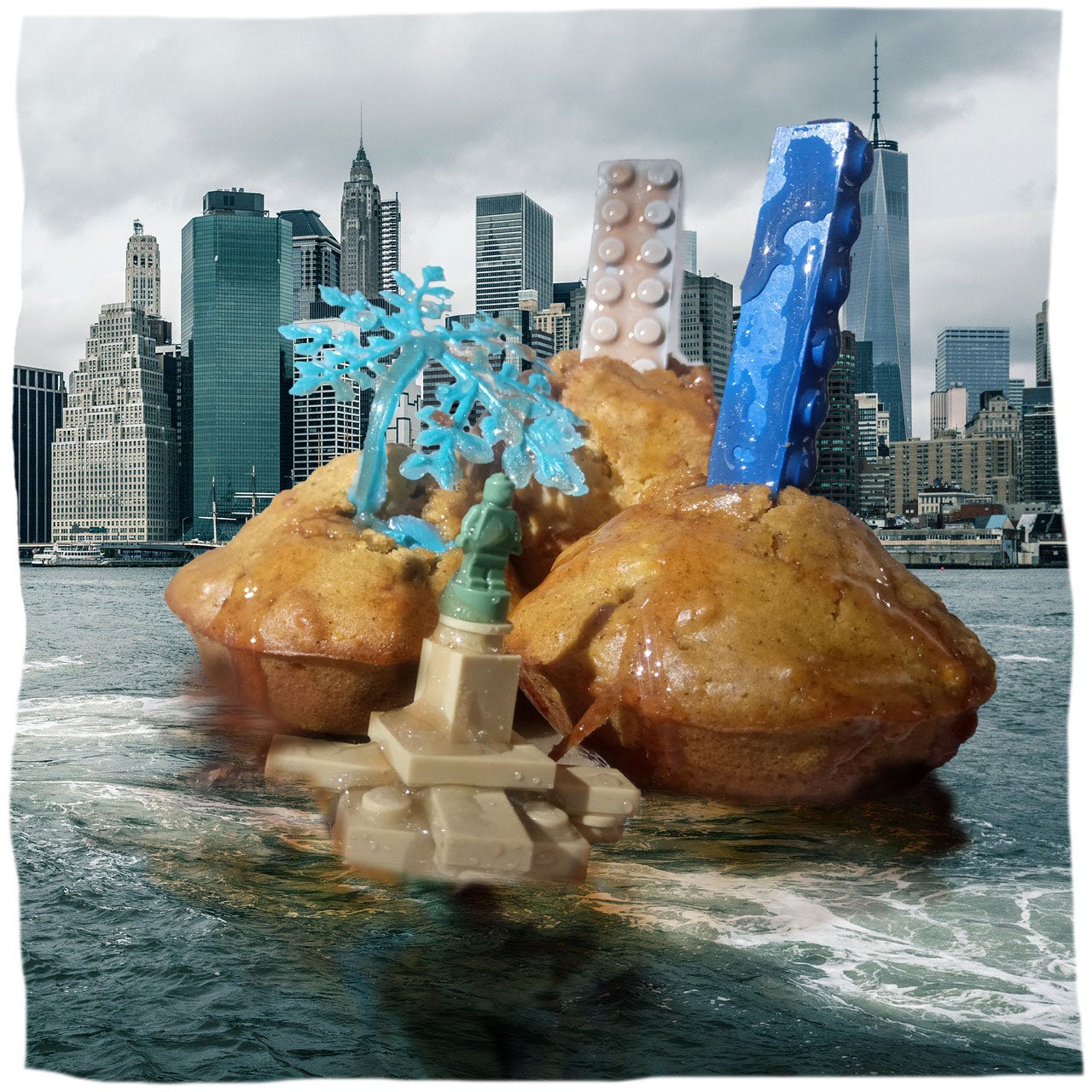
We learnt it as a pledge for our communities though, morality – so that we could be strong together.
I sat in the car, an accidental onlooker to a small Remembrance Day gathering on the first sun-bright day for weeks. The light was a slab of equal measure over all bent shoulders.
Baphomet – the goat headed deity worshipped by the Knights Templar and very probably the rulers of our world – is in fact no demon, but the manifestation of balance: thesis, antithesis, synthesis. The Hegelian Dialectic, of which some of us have recently read so much.
I have a lot of books here on the practice of magic. My father’s Godmother – known only to us as strange “Aunty Cini,” who curled up as a cat and meowed through the days before her death – was a friend of Crowley’s, as well George Orwell’s lifelong love. Julia in 1984 was based on her.
I didn’t like the books she’d sent my father though. Crowley described magic as the act of creating change according to will – and on a deep level, I don’t believe that should be done. I was raised as an atheist but I’m not one any longer.
My cattle farming neighbour told me that the dairy industry is better now. Ten years ago, the calves were taken after birth and shot. Now they are transported to be fed into the meat industry. They will live perhaps a year. Their mothers, milked of that which would have strengthened and sustained their young, die themselves, he says, by the age of five. Their feet rot. Their udders burst. This is what better means.
There’s no avoiding the raw question of my own morality now; the price of my life. I can see the sum total of my family’s survival in sacks of potatoes, in fat caged cabbages, in skins and in skulls. And I can see our failure to survive, despite what we have harvested, in the purchased flour and oats, the oils, the Sad Cow Butter.
We’d need a whole community to trade with.
Our Halloween table set for guests and divested over the course of the holiday period, at the end of the week I sat alone with mostly empty plates, taking stock as I looked at the decorations I’d set out in the centre of the banquet: hop-binds and spilling apples, a preserving jar filled with tiny liberty cap mushrooms, now depleted candles and a wicker basket holding two ram’s horns.
It’s not convenience that modern civilisation is ready to give away so much for, I think, but ignorance – the ability to turn away. In those two curving horns – muted-black and ringed like trees – you can see the incarnation of a deity: a force opposing our own.
Perhaps the Horned God – now known by a different name – was born of shame.

As the 21st century rolls over us, big data colonising all boundaries, AI is beginning to take stock for us all. Once, our morality was mapped by the fit of our face within our community.
Communing in new ways now though, our networks disseminated in satellite constellations, we find that algorithms have begun to weigh up our moral worth. As CBDCs arrive, they’ll allot rewards and freedoms for us too. Shaping our society according to the values instilled in their master program, they’ll make decisions on our behalf – either punishing or simply removing wrong choices – as they pursue the goals that we may presume to be in line with our own.
For modern ethics is a maelstrom. Who can know which side the next door neighbour’s on? There are so many issues, you could mummify your house with flags and stickers. Crossing the no-man’s-land of the dairy aisle, it would be no surprise to anyone if you just wanted to grab your milk and run – oat, goat, lactose free or Proudly British.
We’re afraid to stand out when we don’t know what right means for others.
Just last year, after all, as the unvaccinated were banned from French supermarkets, subjected to Austrian house arrest or, in Germany, fines, it became clear that the God of Provision our world now worships may not be one of unconditional love.
When, as communities, we give away the interdependence of our survival, then the interdependence of our judgement goes too. And what we’ve lost – without knowing, as pennies through our fingers – would in accumulation have once been our collective will.
If it is the Co Op that offers us subsistence, not our community, then forced to choose between them, who do we have loyalty to?
Octavian is going to a new home next week. He nibbles my fingers like Burtie used to. He stands in the now wintry morning sun and loudly proclaims his right to life.
I am trying to decide whether or not to carry on.
Farmers have borne the sins of the world for a hundred generations. Priests may abstain from sin to offer some channel to the heavens they believe in, but farmers know the good and evil of man. On others’ behalf, they perpetrate; providing subsistence from the clean-washed product of their acts. And even farmers do not slaughter now. I have known three boys – becoming men – who worked as abattoir knackermen, each finding their own way to live around the walls drawn inside their minds.
A little while ago, I tried to paint a verbal picture of the milk I take, to describe it to another artist. But I do not think it is possible to understand the blood that lies underneath its surface unless you’ve slaughtered the child of the mother you milk. Perhaps not even then, unless you’ve been a mother yourself.
I could talk to you about my own values – but as you can see they are not unconflicted. There is no subject that we’ve covered here on which I’m clear. I have been polyamorous most of my adult life. When, last month, vegan protests saw dairy products strewn across the floors of supermarkets, broadly speaking I stood with the protestors, though they wouldn’t have welcomed me. My faith is a tangle of fertility rite folklore and the penetrative sunbeams Christianity has utilised to burn through the darkness of guilt and fear. I’d be a socialist, but you can’t trust the government, or a free marketeer except for the businessmen. We live in an imperfect world. Perhaps there’s no value that we have in common. These are the days of black arts; of a weaponised multiplicity.
Google’s talked about their values. Their Goal Driven Ledger is really just the modern elucidation of an ancient belief: that the word of God can be incarnated in the coalescence of our voices.
We have got to make the choices ourselves though, for our voices to have meaning.
Once we all have Fitbits, they believe, and soon after that RFID chips, we’ll be able to offer up our data blessed by the knowledge that we’ve played our part. This is the singularity that’s meant to birth our next religion. Our aggregate of shaped behaviours a new evolving godhead of information – born to outlive, not only us and our children, but our kind – we last sapiens, satisfied contributors, can kick back and, as I understand it, expire and fall away.
The comparison they make is slime-mold. So nothing ungodly about that.
In the Pentateuch – scholars of magic will tell you – each sentence, ascribed its Hebrew numerical value, can express an infinite number of sacred creations. This makes it the voice of the eternal. I haven’t checked it out. I’m not much of a one for pure maths. Maybe Google’s R&D team – as intelligent, sentient and beanbag-zen as I know them (in one case personally) to be – can sink those hoops.
The god that they’ll create will die though.
It will die because it will not understand what it consumes in order to exist. It will not grasp the worth of free choice.
Last week I made black pudding. It is one of my values to use every part of the animal I have taken and, as one of our freezers gave up the ghost, all its other contents transferred, there was no room for this ingredient. For the sake of others, I worked in the kitchen on my own at night. The lidded bucket had been filled in irregular increments throughout the year; a gallon, maybe more. Taking off its plastic top, the surface of the blood stole light.
What would the world be like if each of us knew the cost of our own presence? If each of us faced intimately the loss that pays for us to survive?
I for one will not worship a god that does not understand what it has eaten.
The unformed intricacies of our hearts, which are our own magic – drawn upon by one religion or another, used by storytellers for generations to ensure the survival of our communities, but twisted too, throughout history, to facilitate our oppression – they are a wellspring of power.
When we know what we consume, we must draw upon that force ourselves.
For then we must ask ourselves: what is it worth, that I should live?
For what do I live?
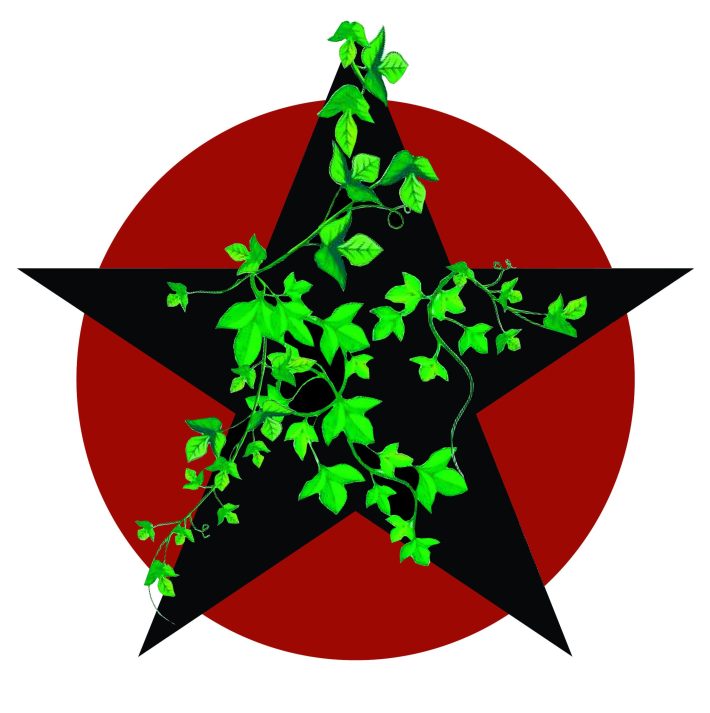
Previous Walking With Goats column: The Value of Living Crisis
Source: Winter Oak
No comments:
Post a Comment